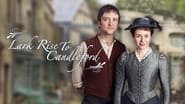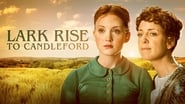Bertie Wooster
Period pieces are really hard.Done right, they are incredibly powerful because they demonstrate how random our prejudices are by showing plausible people with entirely different prejudices who still manage to be entirely human. Think, for example, of how Master and Commander made it seem not only fully real that a 12-year-old could lead men into battle but also completely natural within the film's world.But tricks like that are very hard to pull off, and nearly every period piece falls into one of two opposing traps. Either they show people who act in ways that modern people cannot fathom — without conveying why they act like that — and thus make their characters seem wooden and fake. Or, at the other end of the spectrum, the characters speak and act in entirely modern ways that seem ridiculous to anyone with even the haziest memories of history class.Lark Rise to Candleford falls into the latter category. Only one of the show's two dozen characters expresses any Christian faith whatever and all the other characters clearly think him a fool for it. (And he clearly is both a fool and a condescending hypocrite who doesn't understand anything about Christianity.) Men and women interact with absolute equality, at least among all the remotely sympathetic characters. Entire communities are just fine with obvious infidelity and basically everything else that would seem fine to a modern BBC exec but would, in actual history, horrify a Victorian yokel.That's not to say it's the worst show on earth. To the contrary, it's likable enough, but it's no more an actual period piece that Monty Python's Life of Brian. If that's going to bother you, don't watch.
Keithola1
I'm a 40 year old straight single guy. I would have never even considered watching something like this if someone described it to me or I saw a commercial for it. BUT, the only channel we got clearly at my family's lake house was PBS until the digital transition. After fishing and doing yard work one day, I was drinking a beer and was too tired to get up to change the channel when this came on. I was a little angry at first, but after about 15 minutes I realized that I really wanted to know what happened next to this lady. I ended up watching the whole thing and realized at the end that I had laughed a few times and even welled up with tears once. And I don't think it was from the beer! I watched two more full episodes when I went back to the lake (kind of looked forward to it). I think I need to let me ego heal for a little while before I watch any more, but just had to say that this show has incredible acting, writing, scenery, authenticity to the place and period, and much more. If you grew up watching Little House on the Prairie, you'd really like this (as another reviewer mentioned). Same overall feel, but much more complex stories and more mature themes. I usually don't quite have that willing suspension of disbelief required for something like this, but it is so well done I feel like I'm sitting in the room with them in 19th century England... as if any moment someone will turn toward me and ask if I'd like a spot of tea! Give it 15 minutes and you'll probably be hooked too. Okay, I better go hammer a few nails or work on my car for a while!
thos40
I liked Lark Rise so much in its first season that I sought out and read the book. The power of television! Contrary to what I had expected, the book is not about jolly folk from the hamlet of Lark Rise hob-nobbing more or less comfortably with the townsfolk of Candleford, but one of the richest social histories of England ever written, spiced with very brief stories. I did not mind at all that incidents that took a few lines in the book were blown up into a whole episode -- the writers produced imaginative scripts that kept within the spirit of the book. Nor did I mind at all the introduction of new characters like Sir Timothy. However, the Christmas special betrayed not only the book but even the first season of the TV adaptation, in being unrelentingly soppy, introducing a dopey ghost story, and destroying the sense of place that had been built up in the series. People defied the distance carefully measured out in an episode in the series (and the book) between hamlet and township, and just zipped between them with the ease exhibited by the ghost. Tweeness took over completely. We have not seen series 2 in Australia yet (starts next week), but I do hope that the terribly disappointing Christmas special was an aberration, and that Lark Rise recovers its form.
johnwarthen
Am a U.S.viewer, watching Series 1 on an all-region DVD player. I ordered this series as something my elderly mother might enjoy and have become engrossed myself. Sounding initially like a British variant on LITTLE HOUSE ON THE PRAIRIE, CANDLEFORD turns out to be a rich spectacle which discovers complexities in itself after pleasant but lightweight opening installments and by episode 4 becomes something altogether finer (I've seen only 1-7 so far). I think it not entirely accidental that this same fourth episode engineers a lengthy hiatus for LARK SPUR's most egregious blemish, the already oft-slammed Dawn French as the hamlet's debtor-reprobate. French isn't distractingly familiar in the U.S. but her lazy anachronistic performance, straight out of the classic "Coarse Acting" handbook, is an irritant just the same. Might as well note the other flaws that persist, noted in the more critical IMDb critiques: the usual over-explicit music; some wobbly continuity from one episode to the next (particularly notable in the lack of carryover after the milliner-sisters' traumatic reunion with their father); the disregard for the 18 mile separation of communities so forcefully laid-out in episode 1 and subsequently ignored; and, yes, the absence of squalor. Can't comment on the adaptation's disregard for the source-book since I haven't read it. But lordy, how much else excels! The writing, encompassing parlor-protocol and pub-chatter, has Dickensian swagger. If LARK SPUR's creators disembarked from the original text, they found their independent stride within a few traversals of their 20-or-so characters. Note how the Welsh postman, an evangelical stereotype and already tiresome within the first hour, in Episode 5 has a spiritual crisis, conveyed in a layman-sermon whose earnestness emits a skittering undertone of near-madness (wonderfully performed by Mark Heap). The porcelain lady-of-the-manor of Eps. 1-2 by 6-7 emerges as a tragic heroine. Twister, Lark Spur's aged comic layabout and scrounger, in Episode 6 has recall of a long-dead sister he imagines come back to haunt him in scenes as rapturously sad and true to senescent remorse as any great tragic work (Karl Johnson, an actor I've never noted before, is extraordinary). More than simply showcasing the series' mostly wonderful cast, the collective of directors grows increasingly muscular in their framing of scenes as LARK SPUR progresses: a complex moment in Ep. 7, in which the squire's wife watches her husband across the street and submits to the goading of shopwomen she dislikes, imagining the worst, is shot with an economic forcefulness that moots distinctions between TV and cinematic filming. Nothing "twee" about craft of that order-- nor about the series itself, once past its establishing episodes. Yet subtleties noted here are secondary to something LARK SPUR has in fixed place from the start: Julia Sawalha's post-mistress, and her rapport with lifetime friend and village squire Ben Miles, an attenuated near-romance that in abstract sounds an embarrassment-- two terrific actors who appear to realize they have found gorgeous grown-up roles in the unlikeliest of projects, and like the rest of the production's cast/crew, perform as if BBC's calculations about "Sunday night programing" wholly underestimated their work. I cannot push these Reg. 2 programs at friends, who haven't the equipment to play them, and so I can only enthuse here. This is beautiful serial television.




